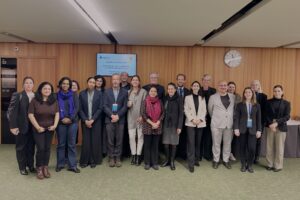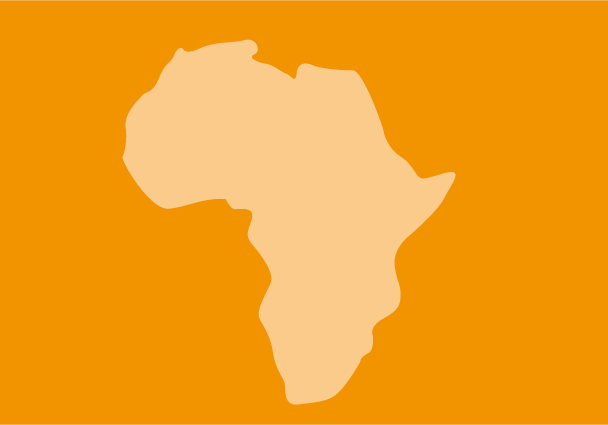
Feb 27, 2014 | News
The ICJ is profoundly concerned at the recent enactment of legislation in Nigeria and Uganda that heralds further persecution based on sexual orientation and/or gender identity.
On 24 February 2014, Uganda’s President, Yoweri Museveni, gave his assent to the Anti-Homosexuality Bill recently adopted by the Uganda Parliament by signing it into law.
His Nigerian counterpart, President Goodluck Jonathan, had signed the Same Sex Marriage (Prohibition) Bill into law on 7 January this year.
In both countries pre-existing legislative provisions already criminalized consensual same-sex sexual activity in private in contravention of international human rights law and standards, including the Universal Declaration of Human Rights, the International Covenant on Civil and Political Rights and the International Covenant on Economic, Social and Cultural Rights.
These core global instruments each affirm the universal and inalienable rights to human dignity, equality and non-discrimination.
“Carnal knowledge…against the order of nature,” for example, was already a criminal offence in both Nigeria and Uganda, carrying, upon conviction, maximum sentences of 14 years’ imprisonment in the former and life imprisonment in the latter.
The new Nigerian legislation makes people of the same gender who contract a marriage or civil union liable upon conviction to 14 years’ imprisonment.
Further, it makes criminally responsible anyone who “administers, witnesses, abets or aids” a same-sex marriage or civil union ceremony, rendering those found guilty of the offence liable to 10 years’ imprisonment.
It also outlaws the registration, activities and funding of any “gay” organization, making them offences attracting 10 years’ imprisonment upon conviction.
In Uganda, the new law, among other things, explicitly criminalizes consensual same-sex conduct between women and makes it an offence for people to discuss and be open about their sexuality.
Further, it criminalizes “homosexuality”, “aggravated homosexuality” and same-sex marriages, all of which carry sentences of life imprisonment upon conviction.
Moreover, it makes it a criminal offence to make available information about sexual orientation, safe sex and gender identity. Renting premises to those who may “practice homosexuality” is also a crime.
The ICJ considers that laws or regulations that directly or indirectly criminalize consensual same-sex sexuality or conduct provide State actors with the means to perpetrate human rights violations, including through harassment, extortion and discriminatory “criminal” investigations, prosecutions, trials and imprisonment.
Equally, these laws enable non-State actors to persecute with impunity individuals based on their real or perceived sexual orientation and/or gender identity.
Indeed, laws that criminalize same-sex consensual sexual activity contribute to an atmosphere of State-supported homophobia and transphobia and serve as both the motivation and justification for harassment, extortion and physical abuse of people based on their real or attributed sexual orientation and/or gender identity by non-State actors.
In the circumstances, not only is cruel, inhuman or degrading treatment at the hands of non-State actors on the basis of real or perceived sexual orientation and/or gender identity not prevented, but such treatment and other human rights abuses are fostered when the authorities enact laws criminalizing consensual same-sex sexuality or conduct.
Overall, the existence of such laws works to deprive individuals who are, or are perceived to be, lesbian, gay, bisexual, transgender or intersex of adequate protection from violence and discrimination, including police protection and judicial redress.
This makes the provision of effective protection by State authorities extremely unlikely if not altogether impossible given that extending such protection would in turn be tantamount to aiding and abetting the perpetration of the very acts that such laws criminalize.
Putting the same point another way: protection is neither effective nor available when laws criminalizing consensual same-sex sexual relations or acts exist, because the individuals who need protection would effectively be outing themselves to the authorities should they decide to seek protection from them.
Accordingly, the existence of these laws entails a real risk of violations of the right to life, to liberty and security of the person, and to mental and physical integrity.
In light of the above, the ICJ considers that Uganda’s Anti-Homosexuality Act and Nigeria’s Same Sex Marriage (Prohibition) Act contravene each country’s respective Constitution and their international treaty and customary law obligations by which both countries are bound.
In particular, the Acts directly violate the right to dignity; equality, including equality before the law and equal protection of the law; non-discrimination; liberty and security of person; privacy; opinion and expression; association and peaceful assembly; and the right to access health services and care without discrimination.
Both pieces of legislation also undermine and criminalize the critical work of human rights defenders and civil society organizations that seek to combat discrimination and persecution based on sexual orientation and/or gender identity.
They also have very serious public health implications, including, for example, as a result of the fact that they hinder the prevention and treatment of HIV/AIDS.
The UN High Commissioner for Human Rights, Navi Pillay, has strongly denounced both pieces of legislation.
In relation to the Nigerian law, the High Commissioner said: “rarely have I seen a piece of legislation that in so few paragraphs directly violates so many basic, universal human rights”.
She further noted that the legislation “purports to ban same-sex marriage ceremonies but in reality does much more.
It turns anyone who takes part in, witnesses or helps organize a same sex marriage into a criminal. It punishes people for displaying any affection in public towards someone of the same sex.
And in banning gay organizations it puts at risk the vital work of human rights defenders who speak up for the rights of lesbian, gay, bisexual, transgender (LGBT) and intersex people”.
In his reaction to the enactment of the Nigerian legislation, the Executive Director of UNAIDS, Michel Sidibé, expressed concern that: “The provisions of the new law in Nigeria could lead to increased homophobia, discrimination, denial of HIV services and violence based on real or perceived sexual orientation and gender identity … It could also be used against organizations working to provide HIV prevention and treatment services to LGBT people.”
In relation to the Ugandan legislation, the High Commissioner said: “Disapproval of homosexuality by some can never justify violating the fundamental human rights of others” adding that the law “will institutionalise discrimination and is likely to encourage harassment and violence against individuals on the basis of their sexual orientation. It is formulated so broadly that it may lead to abuse of power and accusations against anyone, not just LGBT people.”
The ICJ urges the Nigerian and Ugandan authorities to urgently repeal the new legislation, as well as the pre-existing legislative provisions criminalizing consensual same-sex sexual activity in private.
Contact:
Livio Zilli, ICJ Senior Legal Adviser, Sexual Orientation and Gender Identity Programme, t +41 22 379 3823; email: livio.zilli(a)icj.org
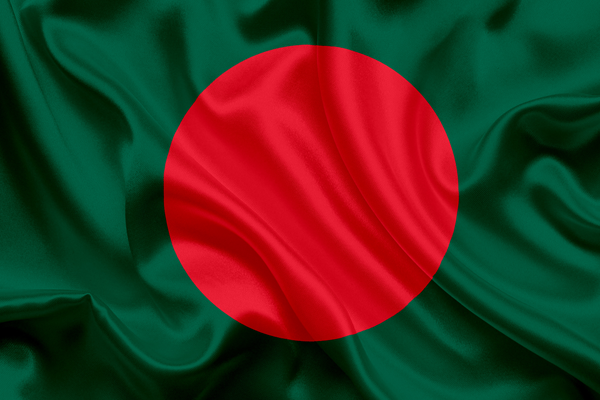
Aug 12, 2013 | News
The ICJ is calling for the immediate release of Adilur Rahman Khan, a prominent Supreme Court lawyer and human rights defender in Bangladesh.
Mr Khan is the Secretary of Odhikar, a Bangladeshi human rights organization that has documented human rights violations allegedly carried out by Bangladeshi security forces.
Plainclothes police officers arrested Mr Khan from his home on 10 August 2013 without an arrest warrant.
“Adilur Rahman Khan is being charged for the lawful exercise of the right to freedom of expression, so Bangladeshi authorities must immediately and unconditionally drop all charges against him and release him,” said Ben Schonveld, ICJ’s South Asia director. “Until the charges are dropped, he must be released on bail.”
Adilur Rahman Khan was charged on 11 August under section 57 of the Information and Communication Technology Act, 2006, for distorting information regarding a police operation on a Hefazat-e Islam rally in May this year.
Odhikar reported that 61 people had been killed in the police crackdown on the rally. The government denied any casualties.
He was not allowed to speak with his family or his lawyers until August 11, when a Magistrate’s Court refused bail and remanded him for a further five days of custodial interrogation.
On August 12, the High Court Division of the Supreme Court stayed the remand order, directing that Mr. Khan be sent back to jail, where he could be interrogated ‘at the gate of the prison.’
“Adilur Rahman Khan’s arrest is illustrative of a deeply worrying government strategy to muzzle and discredit the work of human rights defenders and distract attention from human rights violations,” added Schonveld. “The High Court’s stay of the remand order is a positive development. However, the Bangladesh government must uphold its obligations under domestic and international law to guarantee freedom of expression and allow human rights defenders to carry out their work.”
Article 19 of the International Covenant on Civil and Political Rights (ICCPR), to which Bangladesh is a party, guarantees ‘freedom to seek, receive and impart information and ideas of all kinds, regardless of frontiers, either orally, in writing or in print, in the form of art, or through any other media of his choice.’
The UN Basic Principles on the Role of Lawyers provide that lawyers must be allowed to carry out their work ‘without intimidation, hindrance, harassment or improper interference.’
Further, lawyers shall, in particular, have the right to take part in public discussions of matters concerning the law, administration of justice and the promotion and protection of human rights.
In addition, the UN Declaration on Human Rights Defenders clarifies that States must create an enabling environment for human rights defenders and take all necessary measures to protect human rights defenders ‘against any violence, threats, retaliation, de facto or de jure adverse discrimination, pressure or any other arbitrary action as a consequence of his or her legitimate exercise of his or her rights.’
CONTACT:
Ben Schonveld, ICJ South Asia Director (Kathmandu), t: +977 14432651; email: ben.schonveld(a)icj.org
Sam Zarifi, ICJ Asia-Pacific Director, (Bangkok), t: +66 807819002; email: sam.zarifi(a)icj.org
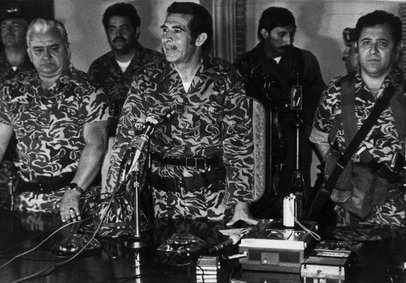
May 21, 2013 | News
El fallo emitido por la Corte de Constitucionalidad constituye un retroceso en la búsqueda de Justicia en Guatemala por las graves violaciones a los derechos humanos cometidas durante el conflicto armado interno, dijó la CIJ.
Es importante recordar que ya en diciembre de 2007, dos de los actuales magistrados de la Corte de Constitucionalidad también otorgaron un amparo al militar retirado General Ríos Montt, evitando su extradición a España. El día de ayer, la CC vuelve a amparar al militar retirado, esta vez para afectar gravemente el derecho de acceso a la justicia de las víctimas del Pueblo Ixil y provocar más impunidad en Guatemala.
Con este fallo, la Corte de Constitucionalidad envía un mensaje equivocado a la población guatemalteca y le da más poder a los victimarios. Sin embargo, la CIJ reconoce que tanto el Magistrado Chacón como la Magistrada Porras, emitieron un voto disidente, apartándose así de la decisión mayoritaria de los magistrados Molina Barreto, Maldonado Aguirre y Pérez Aguilera.
El amparo que la Corte de Constitucionalidad otorgó el día de ayer, lejos de respaldar la justicia, avala las acciones del abogado defensor Francisco García Gudiel, quien faltó a la ética profesional al aceptar la defensa de Ríos Montt, aún sabiendo que la Ley del Organismo Judicial en su artículo 201 literal a) le prohibía “actuar en los juicios en que el juez tuviere que excusarse o pudiera ser recusado a causa de la intervención del profesional.”
Ramón Cadena, Director de la Comisión Internacional de Juristas para Centroamérica expresó: «Nuevamente la Corte de Constitucionalidad está provocando el incumplimiento de la obligación internacional del Estado de Guatemala de juzgar y castigar a los responsables de crímenes gravísimos como el genocidio, crímenes de guerra y crímenes de lesa humanidad. Con dicho fallo, las víctimas del Pueblo Ixil han sido burladas y su derecho de acceso a la justicia ha sido nuevamente negado.»
Otros artículos:
La CIJ expresa su preocupación ante la posibilidad de que juicio por Genocidio y Delito contra los Deberes de Humanidad sea anulado
La CIJ celebra triunfo de la justicia sobre la impunidad
NOTE:
You can find a comprehensive background on the Rios Montt trial in English here
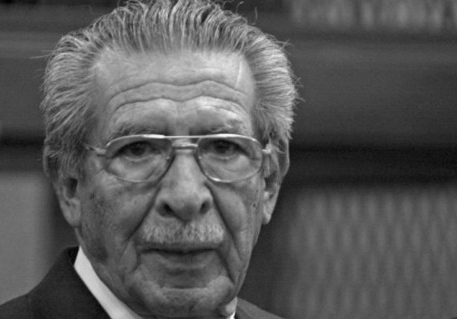
May 16, 2013 | News
La CIJ hoy expresó su preocupación ante la posibilidad de que la sentencia emitida días atrás por el Juzgado de Mayor Riesgo A en el juicio por Genocidio y Delito contra los Deberes de Humanidad sea anulada.
La CIJ tambien expresó su preocupación que el proceso contra el General Efraín Rios Montt (photo) por Genocidio y Delitos contra los Deberes de Humanidad tenga que repetirse.
La Corte de Constitucionalidad (CC) está examinando recursos legales planteados relacionados a la sentencia de 80 años de cárcel contra el exjefe de Estado.
Durante todo el juicio, los jueces del Tribunal recibieron presiones constantes, no solo de parte de los abogados de la defensa, sino que también de otros grupos externos que promueven más impunidad en este caso, dijó la CIJ.
Además, constantemente los abogados de la defensa presentaron diferentes recursos de amparo y otros recursos legales, con el único fin de obstaculizar el proceso y no permitir que se emitiera sentencia.
Frente a todos estos ataques, los jueces del Tribunal de Mayor Riesgo A demostraron una conducta intachable, apegada a derecho y con una firme determinación de terminar con la impunidad que ha existido alrededor de este caso.
Ramón Cadena, Director de la Oficina de la Comisión Internacional de Juristas para Centro América expresó: “Sería muy negativo para el Estado de Guatemala si se llega a anular la sentencia. La impunidad que ha existido ha hecho mucho daño a la población y a las víctimas quienes habían perdido la fe en la justicia.”
Finalmente, Cadena puntualizó: “Es más valioso que un Estado reconozca mediante una sentencia que se cometieron graves crímenes de guerra, de lesa humanidad y genocidio, a seguir escondiendo su responsabilidad con diferentes mecanismos de impunidad.”
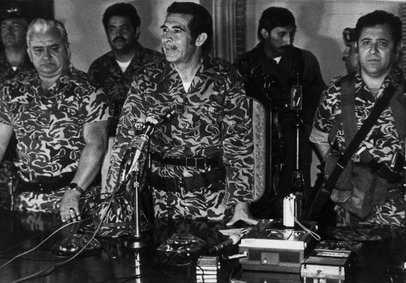
May 10, 2013 | News
La CIJ celebra que el proceso contra el General Efraín Rios Montt (center on the photo) por Genocidio y Delitos contra los Deberes de Humanidad haya concluido el viernes 10 de mayo en la ciudad de Guatemala.
La CIJ observó el debate por medio del abogado Miguel Moerth y apoyó proceso y el debido cumplimiento del Derecho Internacional de los Derechos Humanos y del Derecho Internacional Humanitario por medio del peritaje presentado por el Director de su oficina para Centroamérica.
Dicha oficina se ha mantenido atenta y ha abogado por el derecho de las víctimas a la verdad y la justicia.
Durante el proceso la CIJ llamó la atención sobre el uso abusivo de la figura del amparo, recusaciones, incidentes y otros recursos presentados por la defensa que pretendieron en diferentes momentos anular u obstaculizar el desarrollo del juicio.
La CIJ respalda decididamente al Tribunal de Mayor Riesgo “A” por haber llevado a cabo su difícil tarea, con respeto a las normas del debido proceso y la garantía del derecho de defensa de los acusados y, por haber resistido con las presiones recibidas durante el juicio, que incluyeron amenazas contra integridad personal de miembros del Tribunal.
La CIJ considera que el derecho de las víctimas a un juicio justo e imparcial y a conocer la verdad de los hechos, ha sido respetado con las acciones llevadas a cabo durante el juicio por dicho Tribunal.
Wilder Tayler, Secretario General de la Comisión Internacional de Juristas expresó: “Celebramos este triunfo de la Justicia sobre la Impunidad. Después de 30 años y de tanto esfuerzo, el derecho a la justicia de las víctimas ha sido respetado; la sociedad guatemalteca ha dado un primer y muy importante paso en el camino hacia la reconciliación. Esta sentencia fortalece el Sistema de Justicia en Guatemala y constituye un importante precedente para evitar que crímenes tan graves puedan repetirse. Constituye igualmente un ejemplo para toda la región americana en su combate contra la impunidad”.
Photo: Bettman/Corbias






